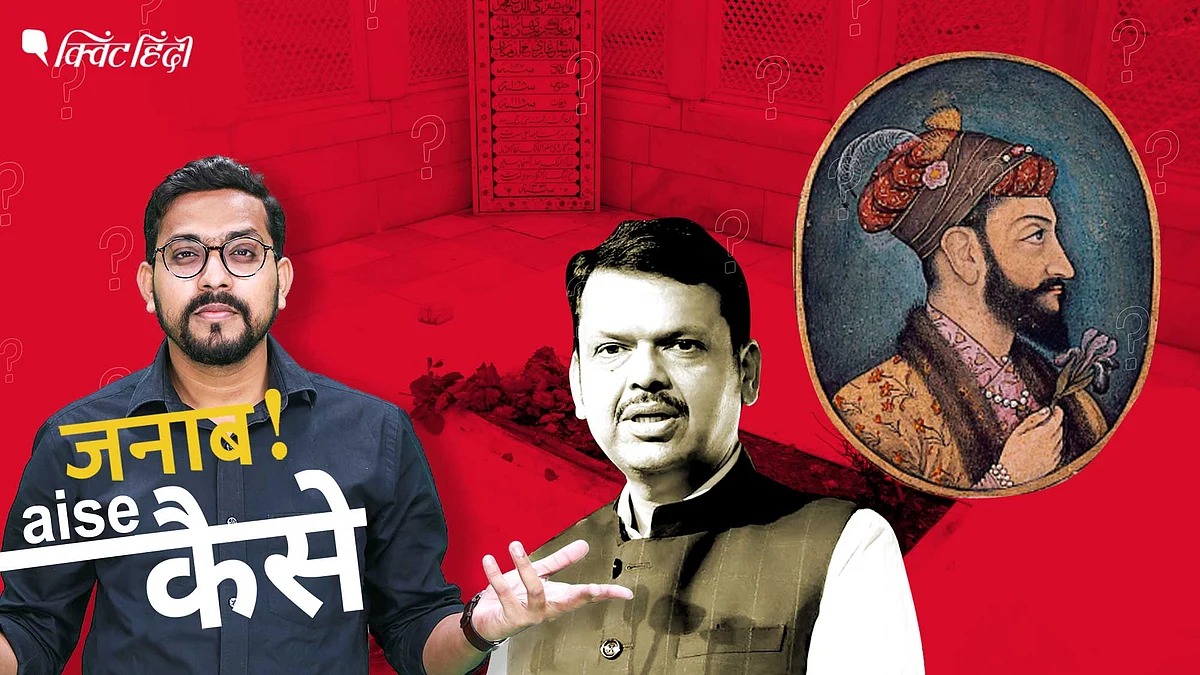Move Over Development, Maharashtra’s Priority: Waging War on Aurangzeb’s Grave
A State in Flames Over a 318-Year-Old Grave

advertisement
On 17 March 2025, members of the VHP and Bajrang Dal took to the streets of Nagpur’s Mahal area, chanting 'Jai Shri Ram' and 'Jai Bhavani, Jai Shivaji'. They demanded the removal of Aurangzeb’s tomb, even setting fire to his effigy. The situation escalated further when reports surfaced of a religious cloth being burnt along with the effigy, triggering communal tensions in the city.
The protests coincided with the release of ‘Chhava,’ a Bollywood film on Shivaji Maharaj’s son, Sambhaji Maharaj. Leaders seized the moment to reignite old wounds, debating Aurangzeb’s legacy—was he a tyrant or a ruler who also funded temples? But while Maharashtra burns over the ghosts of history, the real crises remain buried.
Maharashtra’s Debt: A State in Financial Crisis
While leaders debate Aurangzeb, Maharashtra is drowning in debt. According to NGO Samarthan, Maharashtra is the third most indebted state in India, with over ₹9 lakh crore in liabilities. This means every citizen in the state carries a debt burden of ₹72,761.
CM Devendra Fadnavis defends the debt ratio, arguing that Maharashtra has managed better than other states. But does a centuries-old grave matter more than the financial crisis crippling farmers and small businesses?
27,866 Farmer Suicides in 10 Years: A Crisis Ignored
Between 2015 and 2024, 27,866 farmers in Maharashtra took their own lives. The BJP has ruled the state for eight of those years. Despite loan waivers and relief packages, distress remains high. And yet, the biggest political conversation today is about Aurangzeb’s grave, not the plight of those who feed the nation.
Education: Where Are the Teachers?
Maharashtra’s schools are in dire straits. The latest UDISE report reveals that 8,196 schools in the state have only ONE teacher—responsible for the education of 1.67 lakh students.
A 2024 CETE report found that only 46% of primary school teachers in Mumbai have the necessary qualifications. Worse, 35-41% of maths teachers never studied maths at an undergraduate level. Yet, political leaders are writing ‘theses’ on Aurangzeb instead of fixing the education system.
Healthcare: A System in Ruins
The 2024 CAG report paints a grim picture of Maharashtra’s health infrastructure:
22% of doctor positions vacant in primary and secondary health centres
35% shortage of nurses
42% shortage of specialist doctors
50% shortage of anaesthetists
74% shortage of chest specialists
For a state with a crumbling healthcare system, should historical grievances really be the top priority?
The Political Game: Who Benefits From Hate?
Minister Nitesh Rane, part of Fadnavis’ government, stoked tensions by stating, "It’s time to repeat the Babri Masjid action. Car sevaks did their job back then, and we’ll do our job now." On the same day, violence erupted in Nagpur.
CM Fadnavis now faces a choice: will he take action against his own minister for inciting unrest?
Aurangzeb vs. The People’s Issues
The obsession with Aurangzeb’s grave isn’t new. UP CM Yogi Adityanath famously declared, "Akbar is not a hero, Maharana Pratap is a hero. Shivaji is a hero, Aurangzeb is not." Yet, the Modi government’s G-20 booklet described Akbar as a democratic and tolerant ruler.
The irony? Even Aurangzeb’s army had Hindu generals like Jai Singh and Jaswant Singh. His soldiers included Bhimsen Saxena, a Hindu warrior. The past isn’t black and white—it’s complex. But using it as a distraction from present failures is a political strategy as old as time.
What’s Next for Maharashtra?
As Maharashtra burns over Aurangzeb's 318-year-old grave, its economy, farmers, and students suffer. The real question isn’t whether Aurangzeb was a hero or a villain—it’s why, in 2025, our leaders are choosing him over the people.